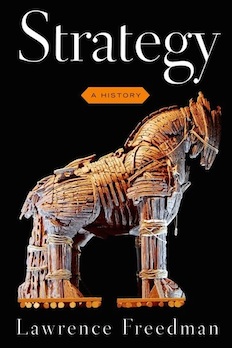By Fred H. Lawson
One picks up this massive volume with great expectations. Lawrence Freedman is arguably the most incisive and highly-respected contemporary British analyst of national security and warfare, and has given us authoritative studies of the 1982 war over the Malvinas/Falklands islands, the 1990-91 Kuwait war, United States military campaigns in southeast Asia during the early 1960s, and America’s decades long involvement in the Middle East, in addition to the single best overview of the evolution of nuclear strategy. Freedman’s mature reflections on the fundamental dynamics of strategic interaction would constitute a significant contribution to several academic disciplines, and a welcome source of practical guidance for general readers.
What the book gives us instead of a synthesis of the author’s extensive scholarship is a collection of short commentaries on a wide variety of topics associated in one way or another with conflict. Many of these observations concern military operations or the use of force in world politics. The war plans that European governments prepared in the years leading up to the First World War are accorded considerable attention, largely to demonstrate the inability of policy-makers to achieve complicated objectives once the shooting starts. Basil Liddell Hart’s innovative notion of indirect attack gets summarized, as do Alfred Thayer Mahan’s and Harold Mackinder’s contradictory views of geopolitics. No more than two pages are devoted to the strategic principles advanced by Antoine Henri de Jomini, despite Freedman’s affirmations that de Jomini’s ideas were more influential than those of Carl von Clausewitz throughout the nineteenth century and that they had a substantial impact on the way that Federal generals prosecuted the American Civil War.
Not surprisingly, the most cogent sections of the book deal with nuclear strategy, in particular the theory and practice of nuclear deterrence. Thomas Schelling is lauded as “the theorist who did more than any other to explain the conundrums of deterrence and nuclear strategy,” even though Bernard Brodie’s seminal contributions keep peeking out from between the lines. Freedman reminds us of the influence that Herman Kahn exercised in policy-making circles and over the popular imagination alike in the late 1950s. Nevertheless, his claim that Kahn served as the inspiration for Stanley Kubrick’s iconic Dr. Strangelove seems implausible, given the obvious similarities between the character in the film and that other public proponent of hard-headed atomic diplomacy—Henry Kissinger.
Freedman proposes in the Preface a stimulating definition of strategy: “It is about getting more out of a situation than the starting balance of power would suggest. It is the art of creating power.” Later on, he asserts several times that strategy does not come into play whenever a powerful actor prevails over a weaker adversary. Strategy is involved only on those remarkable occasions when the side that finds itself at a disadvantage manages to come up with some way to emerge victorious. If winning requires prevarication or deception or an abrogation of the accepted rules of combat, so be it.
Elaborating the implications of this provocative insight, gleaned from a lifetime of meticulous observation of diplomats and military commanders engaged in life-or-death struggles, could have provided coherence and originality to the assorted vignettes that make up Strategy: A History. Freedman returns to the initial proposition in the book’s closing chapter, only to conclude that the pervasive complexity and unpredictability of world affairs make successful strategic planning impossible. Still, Freedman argues, the act of devising strategies as a way to deal with actual and potential conflicts is not a complete waste of time. Making the effort to consider the possibilities open to us in any given situation, or in dealing with any particular antagonist, prepares us to respond to unanticipated twists of fate with fortitude, flexibility, and creativity. Niccolo Machiavelli says much the same thing, albeit with much less supporting evidence.
Fred H. Lawson (ΦBK, Indiana University, 1973) is the Lynn T. White, Jr. Professor of Government at Mills College and a resident member of the Zeta of California chapter of Phi Beta Kappa.




